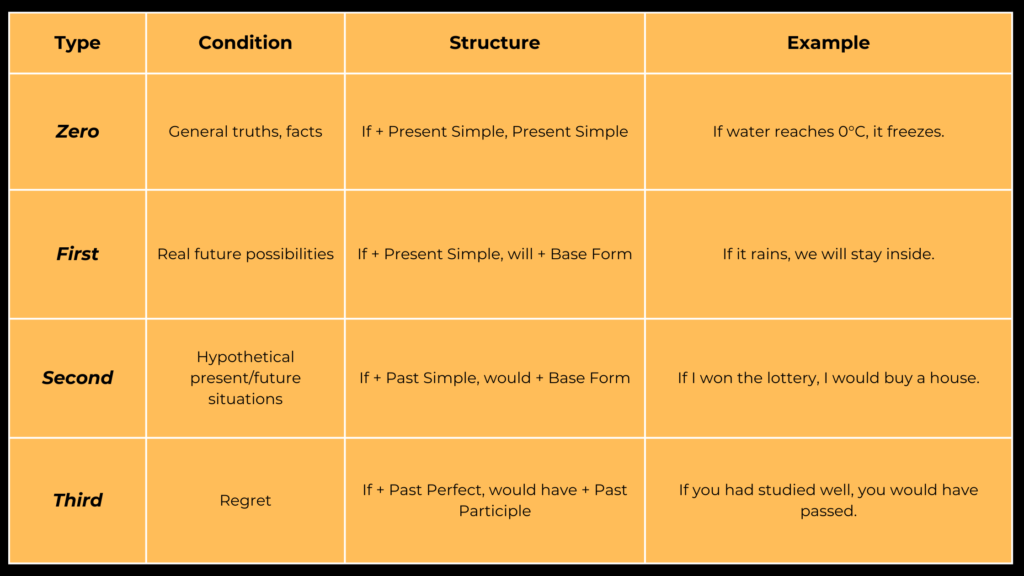Ever wished you could predict the future, reflect on missed opportunities, or talk about “what could have been”? English conditional sentences let you do exactly that! From simple everyday truths to hypothetical situations, conditionals unlock a world of expression in any conversation. Whether you’re navigating day-to-day plans or exploring imaginative “what-if” scenarios, mastering conditionals is the key.
Let’s master four types of conditional sentences, understand their unique rules, and see how each can transform the way you speak about reality, probability, and imagination.
What is a Conditional Sentence?
In English, a conditional sentence talks about a situation that depends on a condition being met. Typically, a conditional sentence has two clauses:
- If-clause (Condition): The condition that might happen.
- Main clause (Result): The outcome if the condition is met.
The 4 Types of Conditional Sentences
Each type of conditional expresses a different degree of possibility, ranging from likely to hypothetical scenarios. Here are the four types:
- Zero Conditional
- First Conditional
- Second Conditional
- Third Conditional

1. Zero Conditional (Facts and General Truths)
Usage: The zero conditional is used for situations that are always true, like scientific facts, general truths, or common sense situations.
Structure:
- If + Present Simple, Present Simple
Examples:
- If you heat water to 100°C, it boils.
- If people don’t drink water, they get dehydrated.
- Plants die if they don’t get sunlight.
- You feel tired if you don’t sleep enough.
2. First Conditional (Real Situations in the Future)
Usage: The first conditional describes possible future events or situations. It’s used when there is a real chance that the condition will happen.
Structure:
- If + Present Simple, will + Base Form
Examples:
- If it rains tomorrow, I will cancel the trip.
- If you study hard, you’ll pass the exam.
- I’ll call you if I finish work early.
- You will feel better if you take this medicine.
3. Second Conditional (Unlikely or Hypothetical Situations)
Usage: The second conditional talks about unlikely, hypothetical, or imaginary situations in the present or future.
Structure:
- If + Past Simple, would + Base Form
Examples:
- If I were rich, I would travel the world.
- If she studied harder, she would get better grades.
- You would feel healthier if you exercised regularly.
- He would help you if he were here.
4. Third Conditional (Imaginary Situations in the Past)
Usage: The third conditional describes hypothetical situations in the past that didn’t happen. It often expresses regret or reflects on how things could have been different.
Structure:
- If + Past Perfect, would have + Past Participle
Examples:
- If I had known about the event, I would have attended.
- If you had called, we would have picked you up.
- She would have passed the test if she had studied more.
- They would have been happier if they had moved to a different city.
Conclusion
To sum up, conditional sentences are essential tools in English, helping us express varying degrees of possibility. The four types of conditionals—Zero, First, Second, and Third—offer flexibility in discussing real, probable, hypothetical, and past hypothetical scenarios.

Practice Exercises: Fill in the Blanks with Conditionals
Here are 20 dialogue-based fill-in-the-blank exercises for practicing conditional forms.
- If I __________ (know) the answer, I would tell you.
- She __________ (help) you if she had known you needed it.
- If he __________ (be) a bit more patient, he might succeed.
- If you __________ (finish) your work, we can go out for dinner.
- If the weather __________ (be) nice tomorrow, we’ll go hiking.
- You __________ (not feel) so tired if you went to bed earlier.
- If I __________ (study) harder, I would have passed the exam.
- They would travel more if they __________ (have) enough money.
- If I __________ (be) you, I would take the offer.
- If she __________ (call) me, I would have answered immediately.
- We __________ (get) better seats if we arrive early.
- If you __________ (practice) every day, you’ll improve quickly.
- If they __________ (win) the game, they will advance to the finals.
- I __________ (move) to the city if I had a job there.
- If he __________ (pay) attention, he wouldn’t make mistakes.
- You’ll miss the bus if you __________ (not leave) now.
- If I __________ (see) her yesterday, I would have told her.
- If we __________ (have) more time, we could visit the museum.
- If you __________ (ask) politely, they might let you in.
- If the company __________ (hire) more staff, the workload would be manageable.
Book your Free 30-minute 1:1 session with me today to enhance your Personality Development & Communication Skill
Take action now—because your dream job is closer than you think >> Click the link below to block my Calendar <<

